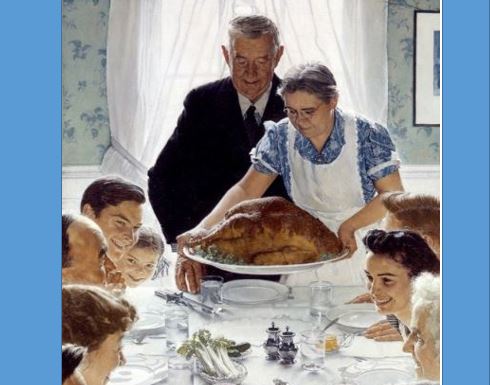There is something both primal and intimate about the act of feasting on food and rich conversation. We share stories like heaping platters of warm pasta and pass traditions along to the next generation like salt to flavor their lives.
Memories and menus are bound together in our emotional makeup, whether it’s the hot dog at Fenway Park or the ice cream on a hot summer night. I still remember the time my father dared me to slip that first oyster down my reluctant throat. I remember making cheesecake with my mother using a recipe that supported two generations of cardiologists.
Even in our fast food culture, we associate feasts and the people we love—and those we’ve lost—in an endless table of rememberance.
There is no feast quite so powerful as Thanksgiving with its iconic turkey, with the side dishes and stuffing that are as particular to our families as DNA. For my family, the menu is as sacred as the lemon pie passed down from one generation to another.
Today, when families are scattered and distracted by every type of technological intruder, the Thanksgiving weekend still sets the stage for real, intimate, and open conversations. And so, we invite you at some point over the weekend, in between football and over leftovers, after the plates are cleared and rest of the pumpkin pie has been retired to the refrigerator, to talk turkey. We invite you to break bread and taboos, and to share your wishes across the generations for how you all want to live at the end of your days.
When we started the Conversation Project, we knew that too many people were not dying in the way that they would choose. Too many survivors were left guilty, depressed, and uncertain about whether they had done the right thing for their loved ones. It seemed that everyone had a story—a story of a good death or a hard death. The difference was often whether they had their wishes expressed and respected.
We knew that we could make it easier. These conversations shouldn’t happen in the ICU. Decisions shouldn’t be left to a harried EMT or a doctor you’ve never met. You should decide in concert with the people you chose to speak for you if you can’t speak for yourself. We need to talk at the kitchen table, before there is a crisis.
These are often seen as hard conversations. They are as tender as love and loss. We stumble and postpone them and assure ourselves that it’s too soon—often until it’s too late. But we can open this up; we can make this a feast of honesty, using stories and recipes as our utensils, talking and eating together, and making this a first course of intimacy and warmth.
Dinnertime conversation? You bet. A blessing over the turkey tetrazzini that makes up the leftover meal. Stories to tell that the children can hear about their elders and ancestors that include endings.
We invite you to start this new tradition, to tell stories, and to think easily, deeply, and with humor and honesty about this one universal experience and its humanity. In return, we promise comfort along with comfort food.


Hi Ellen, great article. I can’t tell you how timely it is too. Not too long ago my mom (who is a proactive gal) gave me copies of her will and living will, which I just tucked away. With Thanksgiving around the corner, and family coming to my place to visit, I know there’s no better time to pull those documents out, read them, and ask my mom if I have any questions. It’s certainly not something I’m looking forward to, but it’s about time I did it!
Highly descriptive blog, I liked that bit. Will there be a part 2?